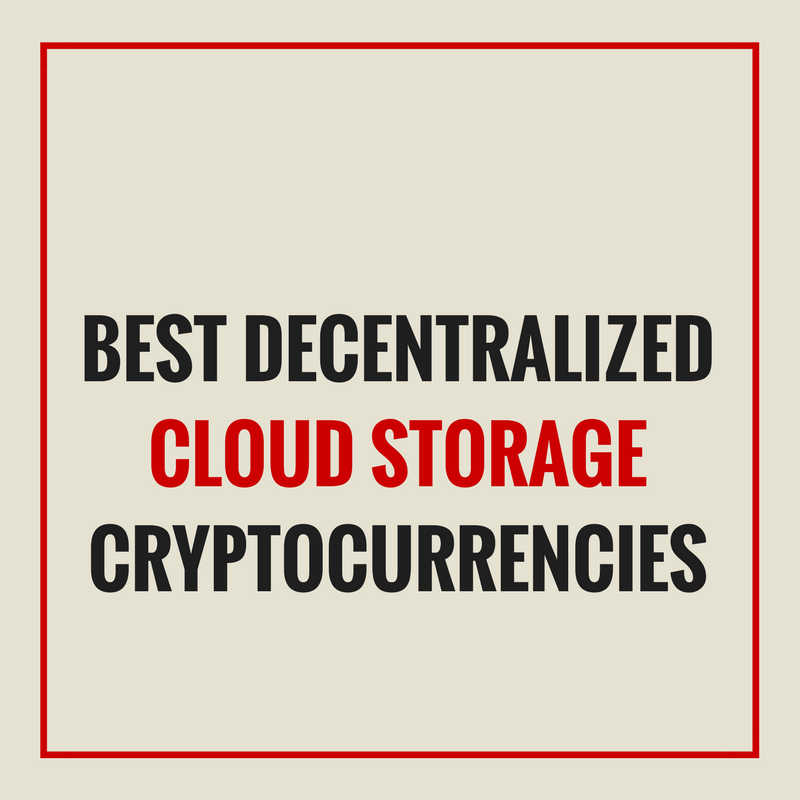
What you'll learn 👉
Table Of Contents
As cryptocurrencies and blockchain networks are becoming more common, multiple new trends in both the “crypto world” and within more traditional sectors are emerging. Blockchain invaded the storage spaces and made a business out of them right when everyone thought it was done spreading its wings.
There are so many ICOs and new projects coming out each day, but not all projects or currencies are worth noticing, because most fizzle out and die while others later turn into scams. In this article, we are going to talk about cloud storage-based cryptocurrencies. They allow users to store their data in hard disc space provided by other users.
The 4 cloud-storage-based cryptos we recommend keeping an eye out for include SIA, Storj, Filecoin, and Minebox.
SIA
SIA was launched into the market on 7 June 2015 and represents a rather new approach to cloud storage platforms. The idea of SIA was conceived at the HackMIT 2013 Hackathon, and it was created by David Vorick and Luke Champine of startup Nebulous Inc (headquartered in Boston, USA). SIA is an open-source, blockchain-based, decentralized cloud storage platform. The SIA cloud is based on a decentralized, redundant architecture, which means that the stored data does not reside on a central server. Instead, it is broken up into many small pieces on thousands of different servers.
SIA is not a data center operated and owned by a single company. It is actually a platform that allows anyone and everyone to monetize by renting out their hard drive space.
SIA didn’t start with an ICO or pre-mining, unlike many other coins or crypto projects. The team has raised $1.25M in total funding from prominent investors like Fenbushi Capital, Raptor Group, Procyon Ventures, and angel investors like Xiaolai Li.
The integrity of your data is protected through the use of cryptography and redundancy, and the encryption is ensured by smart contract cryptography. It’s also important to note that the data transfer involves no interference by any third party.
All the transactions occur in Siacoin, which is a special-purpose currency for the Sia network which executes file storage contracts on the Sia blockchain. SIA appears to be the most affordable and beneficial cloud storage crypto coin so far and its current market cap value stands at $244,244,435.
Storj
Storj, pronounced “Storage”, offers decentralized, end-to-end encrypted cloud storage and its main goal is to solve problems relating to data security issues and is working hard to do that.
Storj is a cloud storage platform that cannot be monitored, cannot be censored, and will not have any downtime. Storj offers several advantages over more traditional cloud storage solutions; the users’ files are encrypted, shredded into little pieces, and stored on a decentralized network of computers globally, so there is almost no conceivable way for unauthorized third parties to access that data. This allows Storj to be a faster, cheaper, and more reliable network. The company claims this system is up to 50% less expensive and 10X faster than traditional data center-based cloud storage solutions.
Storj uses blockchain features like public/private key encryption, a transaction ledger, and cryptographic hash functions for security.
Storj was launched on 18th July 2014 with the aim to change the rudiment ways in which people and devices own data. Storj was founded by Shawn Wilkinson (CTO and CEO), John Quinn (Chief Development Officer), James Prestwich (COO and CFO), and Tome Boshevski (Chief Design Officer), and its headquarters is located in Atlanta, Georgia, USA.
MaidSafe
MaidSafe aims to do more on its network than trade storage; it markets itself as a “crowdsourced internet,” on which not only data is stored but decentralized applications live. Miners rent out their unused computing resources to the SAFE network, including hard drive space, processing power, and data connection — and are paid in the native Safecoin.
The SAFE network also supports a marketplace in which Safecoin is used to access, with part of the payment going to the application’s developer. Miners can also sell the coins that they earn for other digital currencies, and these transactions can happen either on the network or directly between individuals. Filecoin also aims to allow the exchange of its tokens with fiat currencies and other tokens via wallets and exchanges.
Filecoin
Filecoin is a blockchain-based marketplace that allows its users to monetize their unused storage space by hosting files for a fee. Clients pay for these services in the platform’s native token Filecoin, which can then be traded for Bitcoin, Ethereum, USD, and other currencies as well.
Filecoin strongly ensures its users that the files being shared and transferred on the platform are thoroughly secured because the entire network is supported by end-to-end encryption and is decentralized. A different feature of Filecoin is that users can adjust their storage strategy as per their needs and strike a custom balance between cost, retrieval speed, and redundancy.
Filecoin was launched in 2014 and was built by the venture-backed Protocol Labs, who’s based in San Francisco, California. Filecoin had already raised over $50 million from VCs like Andreesen Horowitz before they launched their ICO, which raised nearly $200 million, of which $186 million were raised within the first hour of the sale.
SWARM
Swarm is a distributed storage platform and content distribution service, a native base layer service of the Ethereum web 3 stacks. The primary objective of Swarm is to provide a sufficiently decentralized and redundant store of Ethereum’s public record, in particular, to store and distribute dApp code and data as well as blockchain data. From an economic point of view, it allows participants to efficiently pool their storage and bandwidth resources in order to provide the aforementioned services to all participants.
The primary objective of Swarm is to provide a sufficiently decentralized and redundant store of Ethereum’s public record, in particular, to store and distribute Đapp code and data as well as blockchain data. [Note that the latter is not part of the current release].
From an economic point of view, it allows participants to efficiently pool their storage and bandwidth resources in order to provide the aforementioned services to all participants.





Great article!! Btw I think you should consider Internxt as well. Maybe you don´t know it but it is a Decentralized Cloud Storage. Currently they have Internxt Drive but in 2021 they are going to add Photos, Send, Teams… I personally love it not just because of its security but because it is so easy to use (sometimes I find other platforms really difficult in terms of use).
I discover the project because of their token and I always recommend everyone to invest on it since it has low market cap and huge profitability. In fact, I prefer $INXT to $SC or $STORJ
How come 0Chain is not mentioned? Partnering with Facebook and Huawei Cloud isn’t something negligible